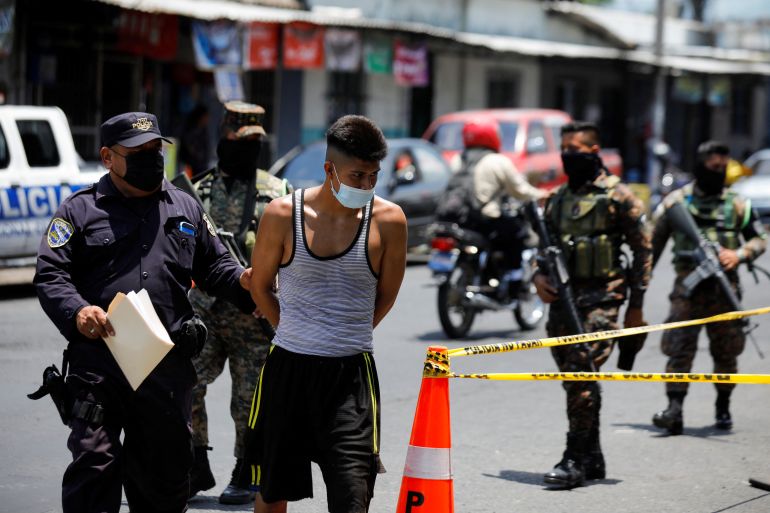El Salvador extends state of emergency amid gang crackdown
Rights groups have accused the government of arbitrary arrests and violations of due process amid two month crackdown.

Legislators in El Salvador have extended a state of emergency backed by President Nayib Bukele for a third month amid a widespread crackdown on gang violence.
Sixty-seven members of the Latin American country’s 84-seat legislature voted on Wednesday for the 30-day extension of emergency powers, which were first approved in March following a surge in gang killings that included 62 murders in a 24 hour period.
Keep reading
list of 3 itemsCan gang warfare in El Salvador be defeated?
As El Salvador’s arrest wave continues, families live in worry
The measure has since been accompanied by a raft of new anti-gang laws rights groups say infringe on the rights of the country’s 6.5 million citizens.
On Wednesday, Bukele’s security minister, Gustavo Villatoro, said the government’s “war” on gangs will continue, even as the homicide rate has dropped sharply since the crackdown began.
“This war is going to continue for as long as necessary and to the extent that the public continues to demand it,” Villatoro said. “We are going to continue to confront this cancer, and we have said it before and we stand by it, this war will continue until the gangs are eradicated from the territory of El Salvador.”
The emergency measures restrict free assembly, curtail the right to be informed of the reason for arrest and access to a lawyer, and allow for detention for up to 15 days without charges.
Bukele has used emergency powers to round up about 34,500 suspected gang members since the end of March, but rights groups and residents say the detentions amount to arbitrary arrests, with many targeted based on their appearance or where they live.
In early May, Human Rights Watch and the Cristosal human rights organisation said they had “received credible allegations of dozens of arbitrary arrests, including some that could amount to short-term enforced disappearances, and of two deaths of people in custody”.
Meanwhile, legislation passed since the state of the emergency was first approved includes laws that allow the lengthening of sentences for gang-related crimes and reducing the age of criminal responsibility to 12.
They also include a law that authorises prison sentences of 10 to 15 years for news media that reproduce or disseminate messages from the gangs, a move that rights groups say hinders press freedom and gang tracking groups.
The spike in the population at prisons in the country has reportedly led authorities to put inmates on reduced food rations and deny them mattresses.
Still, polls have shown support for the crackdown, with many residents saying they are tired of violence in the country, where the murder rate regularly ranks among the highest in the world.
Gangs have long controlled large swaths of territory, driving thousands to emigrate for fear of their lives or of being forcibly recruited.
The gangs’ power is strongest in the country’s poorest neighbourhoods, where the state has long been absent.